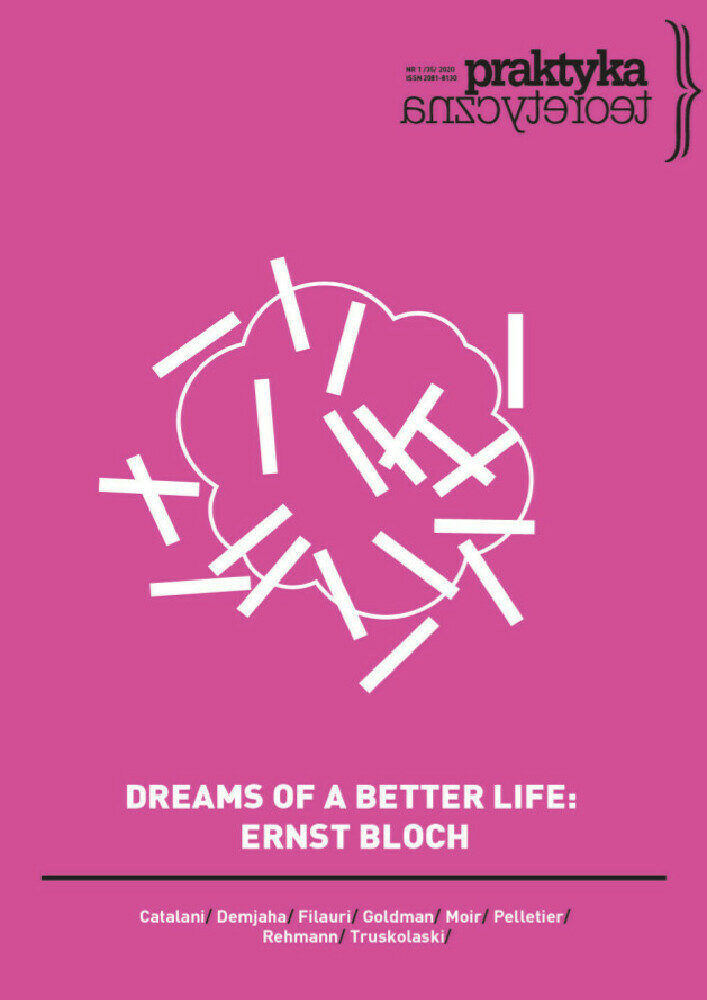Abstract
During a radio debate in 1964, Bloch and Adorno clashed over the status of Utopia in Marx’s thinking. In particular, the disagreement concerned the possibilities (or, rather, limitations) of picturing – with Marx and beyond Marx – a condition in which all societal antagonisms have been reconciled. It is telling, then, that their conversation quickly came to turn on a surprising term: the Old Testament interdiction against making images of God. Given both authors’ commitment to an ostensibly secular critique of capitalist modernity, the prominence of this figure, which is emblematic of the decades-long exchange between these authors, invites further questions. What, for instance, are the epistemic and aesthetic conditions under which Bloch and Adorno propose to present their Marxian Utopias? By considering these questions in light of issues arising from their debate, and applying it to their writings more generally, my
paper aims to contribute to the on-going exploration of “Utopia” in German Critical Theory.
References
Adorno, Theodor W. 1992. Notes to Literature, Vol. 2. Translated by Shierry Weber Nicholsen. New York: Columbia University Press.
Adorno, Theodor W. 1973. Negative Dialectics. Translated by E.B. Ashton. London: Routledge.
Adorno, Theodor W. and Bloch, Ernst. 1988. “Something’s Missing: A Discussion between Ernst Bloch and Theodor W. Adorno on the Contradictions of Utopian Longing (1964).” In The Utopian Function of Art and Literature. Translated by Jack Zipes and Frank Mecklenburg, 1–17. Cambridge, MA: MIT Press.
Bastani, Aron. 2019. Fully Automated Luxury Communism: A Manifesto. London: Verso.
Benjamin, Walter. 1999. “On the Mimetic Faculty.” In Selected Writings 2.2, 1931-1934, edited by Howard Eiland, Michael W. Jennings and Gary Smith, 720–722.
Cambridge, MA: The Belknap Press of Harvard University Press.
Benjamin, Walter. Origin of the German Trauerspiel. Translated by Howard Eiland. Harvard, MA: Harvard University Press Bloch, Ernst. 1995. The Principle of Hope, Vol. 1. Translated by Neville Plaice, Stephen Plaice, and Paul Knight. Cambridge, MA: MIT Press.
Benjamin, Walter. The Spirit of Utopia. Translated by Anthony A. Nassar. Stanford, CA: Stanford University Press.
Benjamin, Walter. 2006. Traces. Translated by Anthony A. Nassar. Stanford: Stanford University Press.
Cohen, Hermann. 1995. Religion of Reason Out of the Sources of Judaism. Translated by Simon Kaplan. Oxford: Oxford University Press.
Elbe, Ingo. 2013. “Between Marx, Marxism and Marxisms – Ways of Reading Marx’s Theory”. Viewpoint Magazine. Last altered October 2013. https://viewpointmag.com/2013/10/21/between-marxmarxism-andmarxisms-ways-of-reading-marxs-theory/#rf43-2941.
Engels, Friedrich. 1989. “Socialism: Utopian and Scientific.” In Marx & Engels Collected Works, Vol. 24: 1874-1883, 281–325. London: Lawrence & Wishart.
Geuss, Raymond. 2019. “A Republic of Discussion: Habermas at Ninety.”, The Point Mag. Accessed 19 January 2020. https://thepointmag.com/politics/a-republic-of-discussion-habermas-at-ninety/.
Hegel, G.W.F. 1975. Aesthetics: Lectures on Fine Arts. Translated by T.M. Knox. Oxford: Clarendon Press.
Honneth, Axel. 2009. Pathologies of Reason: On the Legacy of Critical Theory. Translated by James Ingram et al. New York: Columbia University Press.
Horkheimer, Max. 1970. “Was wir Sinn nennen wird verschwinden – Spiegel Gespräch mit dem Philosophen Max Horkheimer.” Der Spiegel, 5 January 1970: 79–84.
Kant, Immanuel. 2000. Critique of the Power of Judgement. Edited by Paul Guyer. Translated by Paul Guyer and Eric Matthews. Cambridge: Cambridge University Press.
Levitas, Ruth. 1990. The Concept of Utopia. Ithaca, NY: Syracuse University Press.
Löwy, Michael. 1981. “Marxism and Revolutionary Romanticism.” Telos, No. 49: 83–95.
Lukács, Georg. 1988. Theory of the Novel: A Historico-Philosophical Essay on the Forms of Great Epic Literature. Translated by Anna Bostock. London: Merlin Press.
Marx, Karl. 1975. “Letters from Deutsch-Französischer Jahrbücher.” In Marx & Engels Collected Works, Vol. 3: 1843-1844, 141–145. London: Lawrence & Wishart.
Marx, Karl and Engels, Friedrich. 1976. “The Manifesto of the Communist Party.” In Marx & Engels Collected Works, Vol. 6: 1845-1848, 477–506. London: Lawrence & Wishart.
Marx, Karl and Engels, Friedrich. 1996. Marx & Engels Collected Works, Vol. 35: Capital, Vol. 1. London: Lawrence & Wishart.
Mason, Paul. 2016. Postcapitalism: A Guide to Our Future. London: Penguin.
Schmid-Noerr, Gunzelin. 2001. “Bloch und Adorno – bildhafte undbilderlose Utopie.” Zeitschrift für kritische Th : 25–56.
Truskolaski, Sebastian. 2017. “Inverse Theology: Adorno, Benjamin, Kafka.” German Life and Letters, Vol. 70, No. 2 (April): 192–210.
Weber, Samuel. 2010. Benjamin’s -Abilities. Cambridge, MA: Harvard University Press.
License
“Theoretical Practice” seeks to put into practice the idea of open access to knowledge and broadening the domain of the commons. It serves the development of science, thinking and critical reflection. The journal is published in open-access mode under the CC-BY-NC-SA 4.0 license (detail available here: http://creativecommons.org/licenses/by-nc-sa/4.0/). Articles published in the journal may be freely distributed, stored, printed and utilized for academic and teaching purposes without restrictions.
They should not be, however, used for any commercial purposes or be reconstructed into derivative creations. Access to the journal may not be limited or offered for a fee by any third party.
Prospective authors are obliged to fill in, sign and send back the publishing contract compliant with the CC licencing. [PL.pdf, PL.doc, EN.pdf,EN.doc].
According to this contract, authors grant the journal a non-exclusive right to publish their work under the creative commons license (CC-BY-NC-SA 4.0) without any financial obligation on both sides of the contract.
Before submission authors should make sure that derivative materials they use are not protected by copyright preventing their non-commercial publication. Authors are responsible for any respective copyright violations.
